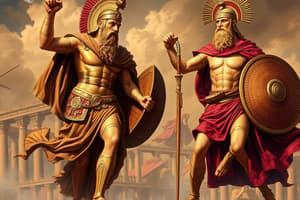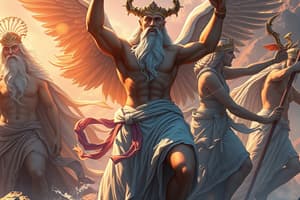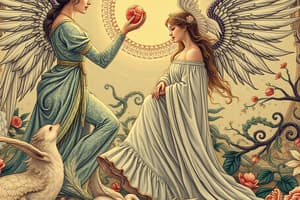Podcast
Questions and Answers
Which of the following are the First 4 Primal Gods by Hesiod?
Which of the following are the First 4 Primal Gods by Hesiod?
- Chaos (correct)
- Gaea (correct)
- Eros (correct)
- Zeus
The king and queen of the 1st dynasty of gods were _____ and _____.
The king and queen of the 1st dynasty of gods were _____ and _____.
Gaea, Uranus
Match the dynasty of gods with their names:
Match the dynasty of gods with their names:
1st Dynasty = Gaea & Uranus 2nd Dynasty = Cronus & Rhea 3rd Dynasty = Zeus & Hera
What is the name of the 2nd dynasty of gods?
What is the name of the 2nd dynasty of gods?
Which of the following are the names of the 12 Olympians and their mothers?
Which of the following are the names of the 12 Olympians and their mothers?
What are the two divisions of mythology?
What are the two divisions of mythology?
What do Divine Myths pertain to?
What do Divine Myths pertain to?
What do Legends pertain to?
What do Legends pertain to?
What are Fables generally about?
What are Fables generally about?
What does Mesopotamia mean?
What does Mesopotamia mean?
The Sumerians are known to have existed from _____ to _____ BC.
The Sumerians are known to have existed from _____ to _____ BC.
What are two inventions of the Sumerians?
What are two inventions of the Sumerians?
What was the capital of the Assyrians?
What was the capital of the Assyrians?
When did the Trojan War occur?
When did the Trojan War occur?
What time period is known as the Dark Age?
What time period is known as the Dark Age?
During whose time were the Homeric Hymns composed?
During whose time were the Homeric Hymns composed?
What is considered the high point of Mycenaean civilization?
What is considered the high point of Mycenaean civilization?
What is the timeline for Hesiod's works?
What is the timeline for Hesiod's works?
What is the time frame of the Hellenistic Period?
What is the time frame of the Hellenistic Period?
Who was Heinrich Schliemann?
Who was Heinrich Schliemann?
Flashcards are hidden until you start studying
Study Notes
Primal Gods
- First four primal deities according to Hesiod: Chaos, Gaea, Tartarus, Eros.
Dynasties of Gods
- Three dynasties represented by kings and queens:
- 1st: Gaea (Earth) & Uranus (Heavens)
- 2nd: Cronus (Time) & Rhea (Motherhood)
- 3rd: Zeus (Sky) & Hera (Marriage)
Names of Dynasties
- 2nd Dynasty: Titans
- 3rd Dynasty: Olympians
Twelve Olympians and Their Mothers
- Zeus, Poseidon, Demeter, Hestia, Hera, Hades (not part of Olympians) all born to Rhea.
- Athena born to Metis and Zeus.
- Apollo and Artemis born to Leto.
- Ares and Hephaestus both children of Hera.
- Hermes born to Maia.
- Aphrodite linked to Dione and Uranus.
Divisions of Mythology
- Two main types of mythology:
- Divine Myths: Focus on gods and their relationships with humankind.
- Legends: Center on human heroes with historical significance.
Types of Stories
- Folktales: No historical basis, highlight human experiences.
- Fables: Primarily involve animal characters.
Mesopotamia
- Definition: "Land between two rivers" (Tigris and Euphrates).
- Sumerians flourished from 3400-2000 BC in southern Iraq, known for ziggurats and cuneiform writing.
- Babylonians existed from 2000-1600 BC in central Iraq.
- Assyrians dominated from 1200-600 BC in northern Iraq, with Nineveh as their capital.
Notable Figures and Events
- Lugulbanda: 3rd ruler of the first dynasty of Uruk post-flood.
- Gilgamesh: 5th ruler of Uruk, known for the Epic of Gilgamesh, around 2700 BC.
- Significant cultural transitions include the entry of Greek speakers into Greece around 2000 BC, influenced by Minoan Crete, Hittites, Mesopotamia, and Egypt.
Key Historical Periods
- Early/Middle Bronze Age: 3000-1600 BC.
- Mycenaean/Late Bronze Age: 1600-1100 BC, with peak civilization from 1400-1200 BC.
- Trojan War occurred around 1200 BC, leading to the collapse of Mycenaean civilization from 1200-1100 BC, characterized by palace destruction.
- Dark Age spanned from 1100-750 BC.
Cultural Influences and Literary Developments
- Aoidoi: Bards who sang of Mycenaean gods and heroes.
- Miasma and Hieros Gamos are important religious concepts in mythology.
- Homer composed the Iliad and Odyssey in the 700s BC.
- Hesiod authored Theogony and Works and Days in 700 BC, while Homeric Hymns were written from 700-550 BC.
Political Developments
- Rise of Athenian democracy occurred around 600 BC.
- Greek tragedies and comedies flourished in the 400s BC during Classical Greece (500-323 BC).
- Hellenistic Period lasted from 323-30 BC, following the death of Alexander the Great.
Archaeological Advances
- Heinrich Schliemann (1822-1890): Pioneered modern archaeological techniques, particularly in Troy and Mycenae.
Myths and Origins
- Many myths about gods and heroes are set against the backdrop of the Bronze/Mycenaean Age (1400-1200 BC).
- Hesiod's Theogony describes the origins: Chaos led to Gaea, Tartarus, and Eros, which gave birth to night and darkness, further producing day and aether.
- Gaea and Uranus gave rise to the Titans, Cyclopes, and Hecatoncheires (hundred-handed giants).
Castration of Uranus
- Gaea, seeking to free her children, devised a plan with Cronus, who used a sickle to castrate Uranus.
Studying That Suits You
Use AI to generate personalized quizzes and flashcards to suit your learning preferences.




